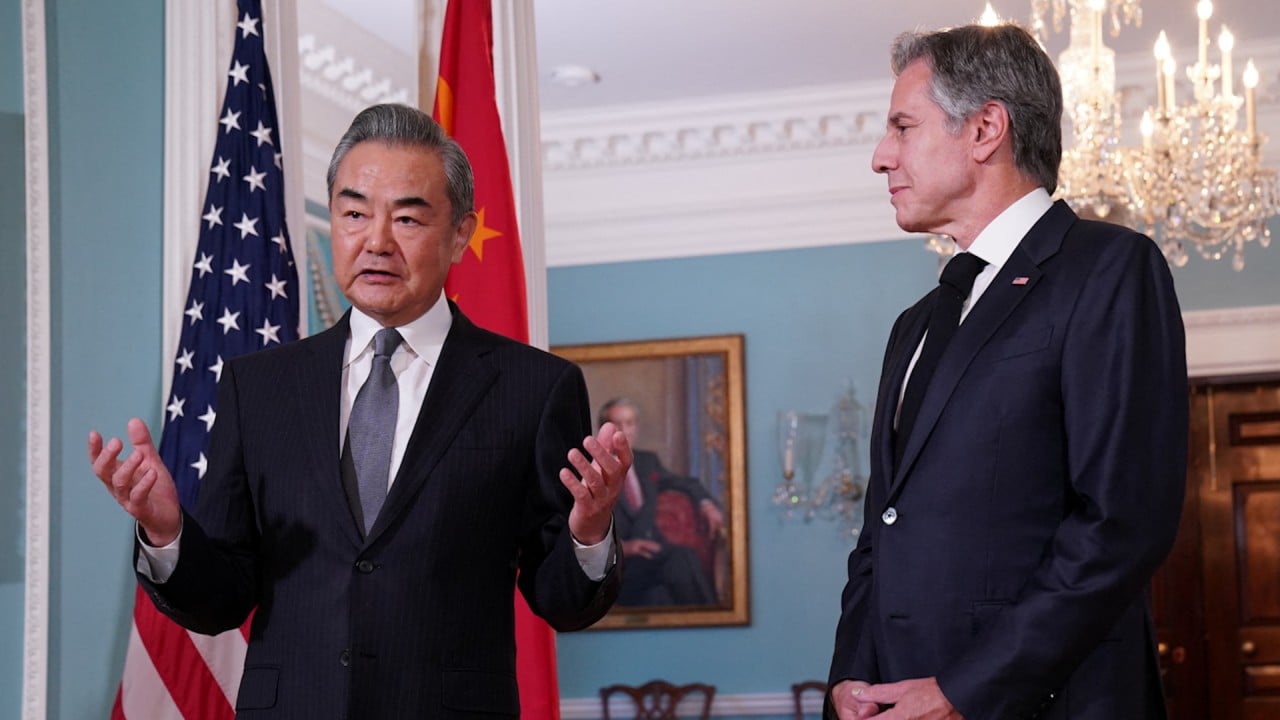
Cooperation is ‘best choice’, right path for China and the US, People’s Daily says
- Commentary in Communist Party mouthpiece says relations cannot be defined by competition, and countries should be partners not rivals
- ‘The future and destiny of mankind’ depends on how China and the US get along, article says, ahead of summit
China sent a clear indication that President Xi Jinping and his American counterpart Joe Biden will meet during a closely watched summit later this month, even though it stopped short of confirming the meeting.
The Communist Party’s flagship mouthpiece People’s Daily said in a commentary on Tuesday that the world expected strained US-China ties to improve, striking a conciliatory tone and setting the stage for the summit.
“The world is currently undergoing profound changes unseen in a century, and the international landscape has undergone major changes. The world needs overall stable Sino-US relations more than ever,” the commentary said.
“The healthy and stable development of Sino-US relations not only serves the fundamental interests of the two countries and their people, but it is also the common expectation of the international community.”
Despite the confirmation from Washington, China has remained vague about Xi’s attendance at the event – a move diplomatic observers suggested could help Beijing retain some leverage.
Observers said Beijing’s reluctance to publicly confirm a commitment was a way to present itself as less eager, and could prompt Washington to act with restraint in the lead-up to the summit.
Asked about the US confirmation on Wednesday, Chinese foreign ministry spokesman Wang Wenbin said only that both countries “agreed to work together towards realising” the Xi-Biden summit in San Francisco. He reiterated Chinese Foreign Minister Wang Yi’s earlier remark that the “road to San Francisco cannot rely on autopilot”.
Wang Yi made the comment during his three-day visit to Washington last week, where he met Biden, as well as US Secretary of State Antony Blinken and national security adviser Jake Sullivan.
The visit was the latest in a string of diplomatic engagements between the two countries as they ramp up efforts to boost communication and manage tensions after relations crumbled dramatically last year.
Chinese and US climate envoys renew talks in lead-up to COP28
The People’s Daily commentary noted that Beijing and Washington had carried out a series of important exchanges, and that there were “some positive signs in relations”.
China, it added, hoped that US-China ties would “stabilise and improve instead of sliding into conflict and confrontation”, and that the two world powers should be partners instead of rivals.
“China has always believed that we must break away from the concept of competition and confrontation, look after each other’s interests and concerns, and seek the greatest common denominator for exchanges and cooperation,” it said.
The commentary – which described US-China ties as “the most important bilateral relations in the world” – urged Beijing and Washington to work together on issues such as the global economic recovery and climate change, adding that international and regional “hot issues” required the cooperation of both countries.
Chinese Vice-President Han to meet US Secretary of State Blinken on Monday
It pointed out that the two countries had worked together to benefit the world.
The achievements included the fight against terrorism, the two nations’ response to the global financial crisis, and their joint efforts on climate change.
“Cooperation is always the best choice for China and the United States … Facing the current increasing global challenges, both sides should choose the right path of cooperation,” it said.
Relations between China and the US have frayed in recent years over areas including trade and technology, while Beijing has accused Washington of containing and suppressing China’s development.
The People’s Daily commentary repeated recent statements made by Chinese leaders, stressing that the “root cause” of deteriorating US-China ties was the “serious deviation in the US’ understanding and positioning of China”.
But it added that differences and competition between the two giants – with their different histories, cultures and social systems – was inevitable.
“This does not prevent the two sides from cooperating based on their common interests nor should it become a reason for confrontation,” it said.
“Sino-US relations cannot be defined by competition, and the bottom line must be maintained to develop Sino-US relations.”
The opinion piece, signed by Zhong Sheng – a pen name the newspaper uses for commentaries on international affairs related to China and an abbreviation for “voice of China” – was its latest on bilateral relations.
Most of the time, such commentaries criticise the US for its policies or voice grievances about containment of China. In February, the paper published a critique of US hegemony, blaming Washington for “stirring up ideological confrontation and coercing other countries to take sides”.
In September, a commentary said that defining the entire US-China relationship in terms of competition was a serious miscalculation.



